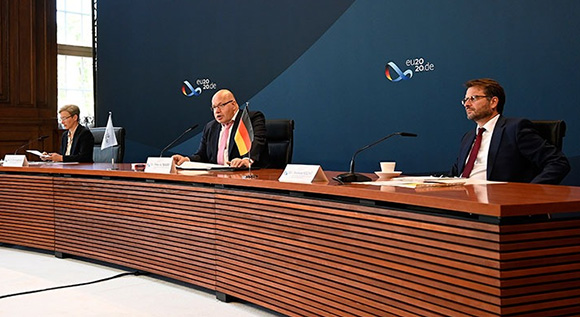How Europe is to reach the 2030 energy and climate targets
The EU's energy ministers have held an informal video conference on how to best achieve the EU's ambitious energy and climate targets for 2030.
 © BMWi/Andreas Mertens
© BMWi/Andreas Mertens
'Today we will be discussing one of the most important issues of our time.' These were the words with which Economic Affairs Minister Altmaier began the informal video conference of the EU's energy ministers on 6 October 2020. Germany holds the Presidency of the Council of the European Union until the end of 2020, and wants to trigger a fresh stimulus for clean growth and innovation in Europe's ambitious energy policy.
The assessment of the National Energy and Climate Plans (NECPs) of EU Member States, released on 17 September 2020, and the Commission's impact assessment underlying its plans for raising the EU's 2030 climate target, provided the basis for the discussion by the ministers from EU and the EFTA countries (Iceland, Liechtenstein, Norway, Switzerland) and EU Energy Commissioner Kadri Simson on joint actions to be taken with a view to attaining the EU's energy targets for 2030. In this context, the role of various instruments to achieve the EU's energy targets by 2030, and particularly carbon pricing and a possible extension of EU emissions trading to cover more sectors, was highlighted.
Minister Altmaier pointed out the absolute need for everyone to pull in the same direction, no matter what their political orientation. 'Climate change is a serious threat to humanity. It will brook no delay, and it demands our joint action. The European Council has therefore decided that Europe should be climate-neutral by 2050. This is an ambitious goal, and it means we cannot afford to lose any time,' Altmaier said.
Great hopes are placed in the European Green Deal, through which Europe is seeking to become the first climate-neutral continent by 2050. The minister stressed to his European colleagues that it is a great challenge, but offers a unique opportunity to make progress on both climate action and commercial activity. Overall, they signalled a high level of support for the implementation of the Green Deal. The majority of energy ministers advocated adapting the interim emission reduction targets up to 2030 so that the great goal of climate neutrality can be attained by 2050.
Altmaier added that the assessment of the National Energy and Climate Plans shows that we need to keep increasing our joint efforts – particularly with regard to energy efficiency and in terms of expanding renewable energy. In this context, many EU Member States highlighted the role of carbon pricing and a possible extension of EU emissions trading. They also said that the impact and interactions with other instruments must be precisely analysed. The majority of ministers also stressed the need for a joint roll-out of renewable energy, particularly in the offshore sector. At the same time, many EU Member States found it particularly important that special national features, affordability for households, and maintaining and boosting the competitiveness of the European economy must always be borne in mind.
Various experts from politics and business also discussed the issue of hydrogen at a high-level conference on 5 October 2020 (read more about this here). Minister Altmaier summarised the range of views at a press conference on the following day: 'Everyone agreed that hydrogen, and green hydrogen in particular, can play a key role when it comes to maintaining the competitiveness of industry and making progress on climate policy in all areas of daily life.'
Further information
- Press release by the Federal Minister for Economic Affairs and Energy 'Economic Affairs Minister Peter Altmaier to chair informal video conference of EU energy ministers'
- Press release by the Federal Ministry for Economic Affairs and Energy 'Green hydrogen is the energy source of the future. Economic Affairs Minister Altmaier hosting high-level hydrogen conference'
- Video from the Federal Ministry for Economic Affairs and Energy: 'Doorstep: High-level conference on hydrogen'
- Dossier by the Federal Ministry for Economic Affairs and Energy: The German Presidency of the EU Council in 2020
- Federal Government website on the German Presidency of the Council of the EU in 2020

